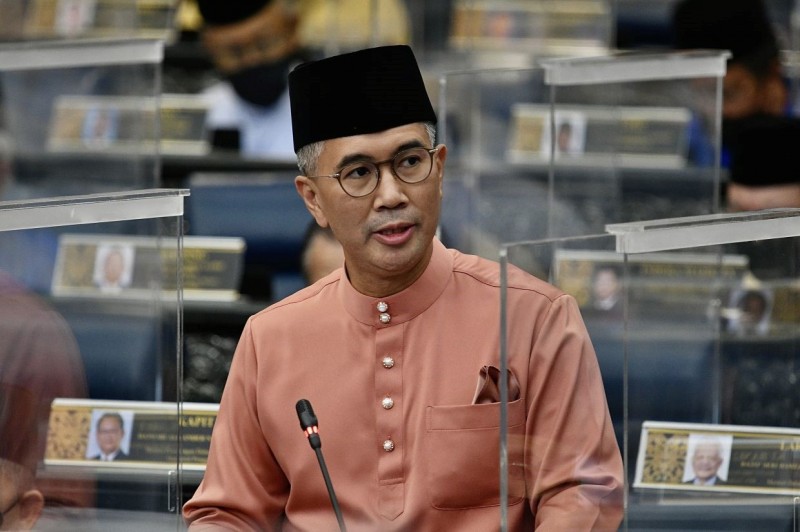
KUALA LUMPUR: Malaysia has no choice but to drive reforms in order for growth to be sustainable and competitive globally, not just domestically, according to Finance Minister Tengku Datuk Seri Zafrul Abdul Aziz.
Speaking in an online interview with Vicky Cheng, who is head of government and regulatory affairs at Asia Pacific Bloomberg, Tengku Zafrul pointed out that Malaysia is committed to becoming carbon neutral by 2050.
“The 12th Malaysia Plan (12MP) aims to create a prosperous, inclusive and sustainable country.
“The plan’s national development priorities are also aligned to Sustainable Development Goals (SDGs), and Malaysia is taking a full vision approach to implement the SDGs and ensuring that no one is left behind,” he said during the virtual Sustainable Finance Week in conjunction with Malaysia’s participation at Expo 2020 Dubai on Nov 8 to 10, 2021.
The virtual conference will highlight Malaysia’s sustainable finance journey and showcase Islamic Finance and Islamic Capital Markets as an enabler in achieving sustainable development globally.
Tengku Zafrul also noted that as envisioned in the Securities Commission’s (SC) sustainable and responsible investment roadmap for the Malaysian capital market (SRI roadmap), the regulator will continue to focus on positioning Malaysia as a sustainable and responsible investment centre in the region.
He pointed out that the country’s economic development has been spurred by industries that are reliant on natural resources such as the oil and gas, and plantation sectors.
“These are big sectors in Malaysia. Because of that, the Malaysian sustainability journey cannot just mirror that of other countries, especially the West,” he said.
He also highlighted the key priorities identified under the Malaysian Climate Change Action Council (MyCAC), which is chaired by Prime Minister Datuk Seri Ismail Sabri Yaakob.
“This includes the implementation of the low carbon mobility development plan, and developing a national low carbon city master plan and also developing a voluntary carbon market which was highlighted in Budget 2022,” he said.
Tengku Zafrul added that the Finance Ministry would try to launch initiatives that promote the circular economy.
“We are looking at a plastic sustainability roadmap, and focusing on employment as well in the green economy via the launch of a green jobs portal.”
Tengku Zafrul pointed out that Malaysia plans to issue RM10bil of green sukuk next year, which would be channelled to social or environmentally friendly projects.
He also noted that in April 2021, the government had successfully priced the world’s first sovereign US dollar Sustainability Sukuk via the issuance of US$800mil (RM3.32bil) 10-year trust certificates and US$500mil (RM2.08bil) 30-year trust certificates for comprehensive distribution stretching from Asia to the United States.
“This will enable Malaysia to not only meet its commitment as a responsible nation and signatory to the Paris Agreement, but also further its efforts to advance its people’s social economic well being. It’s a testament of our efforts in combating climate change, as well as accelerating the transition towards a more resilient and inclusive economy.”
Regarding small and medium-sized enterprises (SMEs), Tengku Zafrul pointed out they make up 40% of the economy but provide 70% of the employment in Malaysia.
“SMEs form a significant part of the supply chain. When it comes to sustainability, a lot of focus is placed on listed and larger sized companies to become more transparent in their transition to become more sustainable.
“But we also must look at the efforts of thousands of smaller companies because when you put them together, this would create a huge impact.”
He said the Malaysian Sustainable Finance Initiative (MSFI) is looking at at enhancing awareness and understanding of issues on carbon footprint among SMEs and a framework of simplified disclosures.
He also pointed out that under Budget 2022, a matching grant to assist SMEs in transitioning to low carbon practices will be made available, and “this is worth RM1bil and will be provided by the central bank.”
Meanwhile, SC chairman Datuk Syed Zaid Albar said in his opening address that Islamic finance gives precedence to funding the real economy, especially productive and sustainable activities with positive social and environmental impacts.
“As a hub for the largest number of Shariah-compliant funds globally, we can see close alignment between Islamic investments on the one hand, and ethical and responsible investing on the other. Given the industry’s Islamic expertise, it would be sensible to leverage existing resources and capabilities to grow both segments to appeal to a wider investor base,” said Syed Zaid.
He noted that since 2014, US$1.8bil (as at October 11, 2021) of SRI sukuk have been issued under Malaysia’s SRI Sukuk Framework.
“Issuances have covered a variety of green and social projects, ranging from solar power and sustainable natural resource management, to green buildings and trust schools,” he said.
Syed Zaid pointed out that sustainable finance bonds have raised a record US$778bil during the first nine months of this year, a 57% increase from 2020 (according to Refinitiv Deals Intelligence).
Nearly half of these bonds are green bonds.
Within Southeast Asia, bonds and sukuk issued under the Asean Green, Social and Sustainability Bond Standards amount to US$16.7bil (as at October 11, 2021 according to Asean Capital Market Forum).
One fifth of these issuers are Malaysian entities.
Syed Zaid also said digitisation has provided the catalyst for Islamic finance to progress.
“For example, automated discretionary portfolio management services – also known as robo-advisory - has widened access to Islamic investing; narrowing the financial inclusion gap and ensuring the benefits of the capital market are shared more widely,” he said, adding that in terms of fundraising, the emergence of equity crowdfunding and peer-to-peer financing platforms has provided micro, small and medium-sized enterprises, or MSMEs, an alternative financing avenue.
“Besides digitisation, another promising source of growth going forward is Islamic social finance. This includes instruments like qard hassan, waqf and zakat. In particular, we see waqf, an Islamic endowment instrument, as an attractive asset class that integrates commercial obligations with sustainability and social objectives,” said Syed Zaid.
Source: https://www.thestar.com.my/business/business-news/2021/11/09/promoting-the-circular-economy

